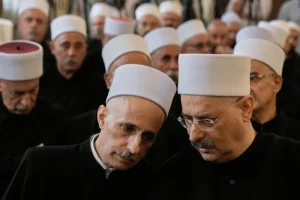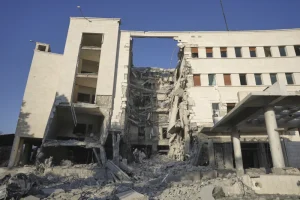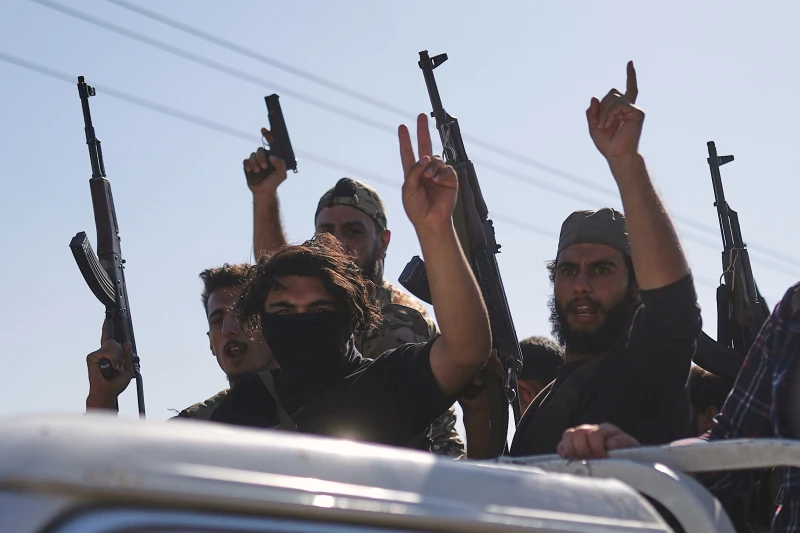US envoy to Syria Tom Barrack said early Saturday that Israel and Syria had agreed to a ceasefire following Israel’s intervention this week in fighting between Syrian government forces and rival armed groups.
The announcement came as renewed clashes erupted between Druze groups and Bedouin clans; Syria’s president said he would send troops back in to quell the fighting, which has left tens of thousands of people displaced in a worsening humanitarian crisis, reports AP.
Barrack said in a statement posted on social platform X that the new ceasefire between Israel and Syria was supported by Turkey, Jordan and other neighbouring countries and called for “Druze, Bedouins, and Sunnis to put down their weapons and together with other minorities build a new and united Syrian identity in peace and prosperity with its neighbours.”
He did not share any details on the agreement.

Clashes began Sunday between Druze militias and local Sunni Muslim Bedouin tribes in Syria’s southern Sweida province. Government forces intervened, nominally to restore order, but ended up taking the Bedouins’ side against the Druze.
Israel intervened in defence of the Druze, launching dozens of airstrikes on convoys of government fighters and even striking the Syrian Defence Ministry headquarters in central Damascus. The Druze form a substantial community in Israel, where they are seen as a loyal minority and often serve in the Israeli military.
The fighting killed hundreds of people over four days, with allegations that Syrian government-affiliated fighters executed Druze civilians and looted and burned homes.
On Wednesday, the Syrian government reached a truce with Druze groups, mediated by the US, Turkey and Arab countries, and began withdrawing its forces from the province. Under the accord, Druze factions and clerics were to maintain the internal security in Sweida as government forces pulled out, Syria’s interim President Ahmad al-Sharaa said Thursday.
However, by late Thursday, clashes were flaring again between the Druze and Bedouin groups in parts of Sweida province, and on Friday al-Sharaa said that the government would send in a “specialised force to break up clashes and resolve the conflict on the ground.”
Officials had negotiated with Druze factions on an agreement to re-enter the area to impose stability and protect state institutions, according to two Syrian officials who spoke earlier Friday on condition of anonymity because they were not authorised to speak publicly. They said an agreement was reached, but later said the deployment was delayed, without giving an explanation.
State media reported that Druze militias had carried out revenge attacks against Bedouin communities, leading to a new wave of displacement.
The governor of neighbouring Daraa province said in a statement that more than 1,000 families had been displaced to the area from Sweida as a result of “attacks on Bedouin tribes by outlaw groups.”
The volunteer group Syrian Civil Defence said Friday that the head of its center in Sweida city had been kidnapped by gunmen two days earlier while on his way to evacuate a UN team.

The official, Hamza al-Amarin, was driving a van with the insignia of the organisation, known as the White Helmets, when he was stopped by militants, the statement said. A person who answered his phone on Thursday said he was safe, it added, but they have been unable to reach him.
The United Nations has been unable to bring in much-needed humanitarian and medical aid because of ongoing clashes. The UN’s migration agency said Friday that nearly 80,000 people had been displaced altogether since clashes started on Sunday.
It also noted that essential services, including water and electricity, have collapsed in Sweida, telecommunications systems are widely disrupted, and health facilities in Sweida and Daraa are under severe strain. The World Health Organisation was able to send trauma care supplies to Daraa province, but Sweida remains inaccessible.


